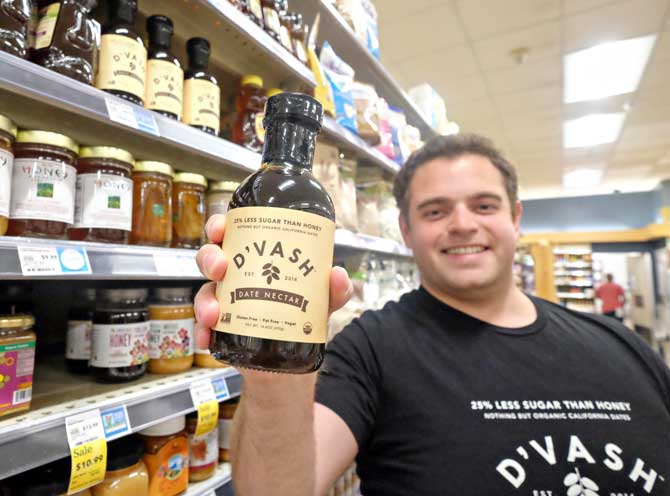This year could be particularly sweet for fast-growing food processor D’vash Organics as it expands sales of its date syrup through new customers Sprouts Farmers Market Inc., Wegmans Food Markets Inc. and Central Market.
The Culver City-based startup has seen sales of its thick, sweet D’vash Date Nectar – used like honey in coffee, tea and yogurt and atop pancakes, chicken and other foods – take off since getting the product into 285 Whole Foods Market Inc. and Thrive Market stores across the country in December.
The company is on the verge of more than doubling its retail presence to more than 700 stores nationwide, in addition to e-tailers including Amazon.com, and its own website. The growth will stem from new distribution deals with the Sprouts, Wegmans and Central Market chains.
Now the challenge for co-founder David Czinn is keeping up with the anticipated demand from gaining so many new supermarket customers around the same time.
D’Vash doesn’t disclose financials, although Czinn said it has sold 50,000 units of its syrup, which goes for $11.99 per 16.6-ounce bottle on its website, since December.
Czinn said he anticipates tripling production and sales, and expects to increase his staff – currently four employees who oversee marketing and contract manufacturing operations at a plant in Anaheim.
“I’ve spoken to my suppliers and we are prepared for the influx in production,” Czinn said.
D’Vash makes use of an oft-overlooked segment of the supply of organic California Medjool dates for an edge: the ugly fruit market. D’vash buys dates that don’t make it into supermarkets because of superficial flaws either from natural causes, humans or machines during the farming process.
It doesn’t matter to D’Vash because the fruits get crushed, heated and pressed in order to produce its branded syrup.
“This worked out well for us as we get the “ugly” dates for a cheaper, wholesale price,” Czinn said. “There are a lot of ugly dates to source from.”
Waste
The Washington D.C.-based Natural Resources Defense Council estimates that 40 percent of American fruits and vegetables are wasted.
“A big part of food waste is imperfect-looking produce,” said Richard Weinroth, program director at North Hollywood-based Food Forward, a nonprofit that collects and re-distributes produce that would otherwise be wasted to hunger relief agencies. “Even fruits cannot escape beauty standards set by society.”
Andrea Spacht, a sustainable food systems specialist with the NRDC, said retailers’ contracts with growers come with stiff physical requirements.
“Shape, size, color, all these factors and more are in the contract,” she said. “If these standards aren’t met, chances are you won’t be shopping for them at big supermarkets.”
The rejection by supermarkets creates opportunities for companies looking to buy less expensive produce and those selling it.
“We’re seeing companies like Imperfect Produce sprout up,” Spacht said, referring to the San Francisco-based “ugly” produce service that sells fruits and vegetables at a 30 percent to 50 percent discount compared to market prices.
Los Angeles also is starting to see companies use ugly produce for their products. Snack brand Strong Food, run by L.A. Kitchen, buys underutilized food for its Apple & Beet Chips product to create jobs.
California is the country’s largest date grower, producing more than 90 percent of the nation’s total, according to the Agricultural Marketing Resource Center, a website run by Iowa State University’s College of Agriculture and Life Sciences.
Most of the date farming is in the Coachella Valley in Riverside County, where date palms first grew after being imported from the Middle East over a century ago.
Dates were a $68 million crop in 2015, the most recent data available from the California Department of Food and Agriculture. The dollar value for the fruit rose 31 percent between 2014 and 2015, and harvested acreage increased to 10,000 acres from 5,500 acres in 2006.
Czinn and his co-founder Brian Finkel, 31, discovered their shared love of dates almost a decade ago when the duo were traveling through the Middle East exploring cuisines.
The pair launched D’vash in early 2017, financing the startup with their own personal savings and funding from investors in Israel, where Finkel moved in 2016.
They initially started selling their product at farmers markets.
Czinn wouldn’t disclose the wholesale prices the company pays for the unattractive dates, or who its distributors are, but did say all the dates are from the Coachella Valley.
“As we expand, we may have to look into getting “ugly” dates from other markets like Arizona, or paying more for dates in general,” he said. “I’m sure we’ll figure it out as we go along.”

